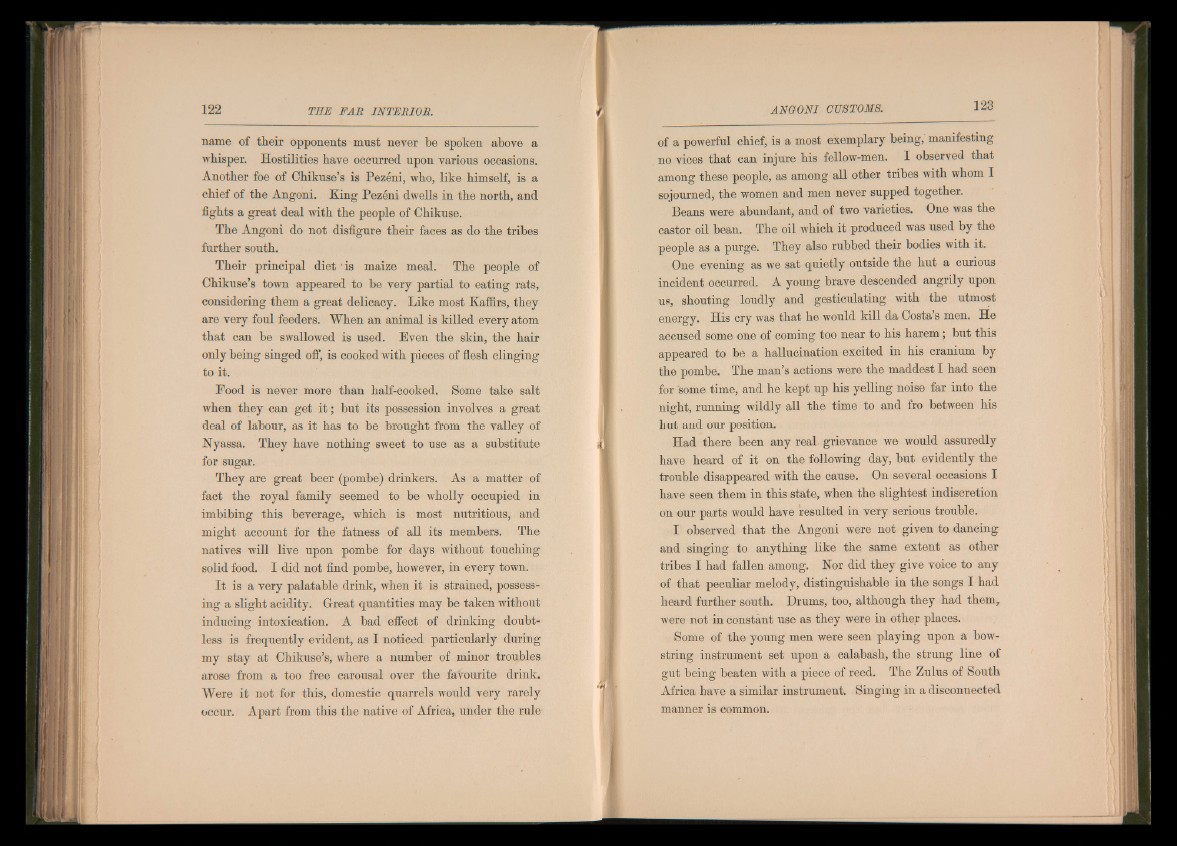
name of their opponents must never be spoken above a
whisper. Hostilities have occurred upon various occasions.
Another foe of Chikuse’s is Pezeni, who, like himself, is a
chief of the Angoni. King Pezeni dwells in the north, and
fights a great deal with the people of Chikuse.
The Angoni do not disfigure their faces as do the tribes
further south.
Their principal diet 'is maize meal. The people of
Chikuse’s town appeared to be very partial to eating rats,
considering them a great delicacy. Like most Kaffirs, they
are very foul feeders. When an animal is killed every atom
that can be swallowed is used. Even the skin, the hair
only being singed off, is cooked with pieces of flesh clinging
to it.
Food is never more than half-cooked. Some take salt
when they can get i t ; but its possession involves a great
deal of labour, as it has to be brought from the valley of
Nyassa. They have nothing sweet to use as a substitute
for sugar.
They are great beer (pombe) drinkers. As a matter of
fact the royal family seemed to be wholly occupied in
imbibing this beverage, which is most nutritious, and
might account for the fatness of all its members. The
natives will live upon pombe for days without touching
solid food. I did not find pombe, however, in every town.
I t is a very palatable drink, when it is strained, possessing
a slight acidity. Great quantities may be taken without
inducing intoxication. A bad effect of drinking doubtless
is frequently evident, as I noticed particularly during
my stay at Chikuse’s, where a number of minor troubles
arose from a too free carousal over the favourite drink.
Were it not for this, domestic quarrels would very rarely
occur. Apart from this the native of Africa, under the rule
of a powerful chief, is a most exemplary being, manifesting
no vices that can injure his fellow-men. I observed that
among these people, as among all other tribes with whom I
sojourned, the women and men never supped together.
Beans were abundant, and of two varieties. One was the
castor oil bean. The oil which it produced was used by the
people as a purge. They also rubbed their bodies with it.
One evening as we sat quietly outside the hut a curious
incident occurred. A young brave descended angrily upon
us, shouting loudly and gesticulating with the utmost
energy. His cry was that he would kill da Costa’s men. He
accused some one of coming too near to his harem; but this
appeared to be a hallucination excited in his cranium by
the pombe. The man’s actions were the maddest I had seen
for some time, and he kept up his yelling noise far into the
night, running wildly all the time to and fro between his
hut and our position.
Had there been any real grievance we would assuredly
have heard of it on the following day, but evidently the
trouble disappeared with the cause. On several occasions I
have seen them in this state, when the slightest indiscretion
on our parts would have resulted in very serious trouble.
I observed that the Angoni were not given to dancing
and singing to anything like the same extent as other
tribes I had fallen among. Nor did they give voice to any
of that peculiar melody, distinguishable in the songs I had
heard further south. Drums, too, although they had them,
were not in constant use as they were in other places.
Some of the young men were seen playing upon a bowstring
instrument set upon a calabash, the strung line of
gut being beaten with a piece of reed. The Zulus of South
Africa have a similar instrument. Singing in a disconnected
manner is common.